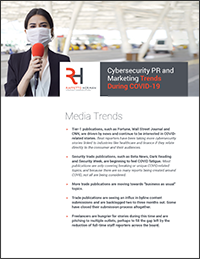Cybersecurity is a fast-paced industry — perhaps never more so than during COVID-19. What does that mean for PR pros today? To answer that, we spoke with our firm’s cybersecurity PR experts.
Our team of cyber experts works with RH Strategic’s cybersecurity clients to tell their stories and navigate the ever-changing media landscape. In the past year, we have driven media campaigns resulting in coverage in top-tier national outlets, such as The New York Times, Bloomberg, Politico, Wired, NBC, ABC News, Forbes, Fortune, and Associated Press, as well as in security and tech-focused outlets like CyberScoop, Ars Technica, Dark Reading, Security Week, The Hacker News and more — and all that in the middle of a global pandemic.
We sat down with some of our cyber PR experts to learn more about their love of cybersecurity PR, and how cybersecurity has evolved to become even more important in today’s world.
What makes high-tech and cyber PR so appealing?
High stakes. In the world of cybersecurity, the stakes just keep getting higher — and the stories more impactful. It feels like every day there are new challenges, new vulnerabilities, new technologies changing the industry. One reason for this is that hacking has become cheaper and easier with the ready availability of exploit kits. Now, you don’t have to be an expert hacker to break through a company’s security; you just need to buy a kit on the Dark Web and look for the holes: cloud misconfigurations, unsecured ports and devices, employees susceptible to phishing attacks. That means that cybersecurity companies must move fast to stay ahead of these hackers, and as their communications partner we need to move just as fast to tell their stories and help educate the public on the risks that exist.
How has cyber PR changed in the past five years?
Companies have had to change the way they communicate during incidents due to interior and exterior pressures on the industry, such as regulations like Europe’s General Data Protection Regulation (GDPR) and the California Consumer Privacy Act (CCPA). The public has also taken a much stronger interest recently in how their data is being used by large companies – and whether their sensitive data is being adequately protected. The economic and social climate has also changed drastically. Big world events have forced companies and nation-states to reconsider their cybersecurity practices and postures, which in turn has changed what the media wants to cover and how we capture their attention.
Why is cybersecurity so important during the COVID-19 pandemic?
Hackers follow the news cycle. Current events give hackers an opportunity to capitalize on fear and the thirst for real-time information, such as data around COVID-19 vaccine research. Information is perhaps more valuable than it has ever been right now. With more and more people working from home, cyber companies and security teams have to not only ensure secure communication in remote work locations but also protect the empty office from a distance. All this means that the marriage between internal and external comms has never been more critical: employees need to know the latest cybersecurity policies, and communicators need to know how to speak effectively with business partners and the media.
Can you tell us about the DCALive cyber roundtable RH Strategic recently attended?
This was a really rewarding event and provided us an opportunity to chat with companies about how the pandemic has impacted them and what challenges they have faced. We were happy to be able to talk to both startups and established businesses about cybersecurity and its intersections with communications and human resources. We also had the opportunity to share our expertise via a resource on COVID-19 Cybersecurity Media and Company trends we designed for the event. Click the thumbnail below to download.

***
RH Strategic is a Seattle and D.C.-based communications firm with a nationwide presence and additional global reach via membership in the Worldcom Public Relations Group. We provide strategic public relations for innovators in the technology, government and healthcare markets.

